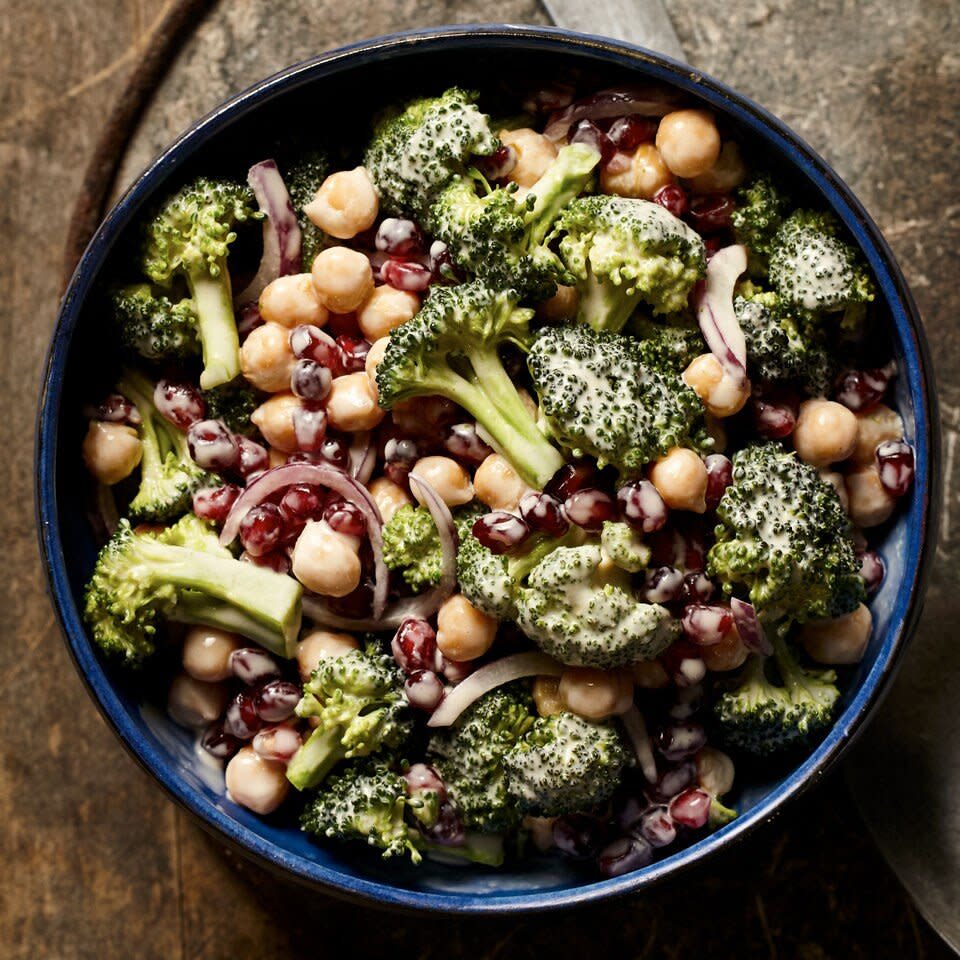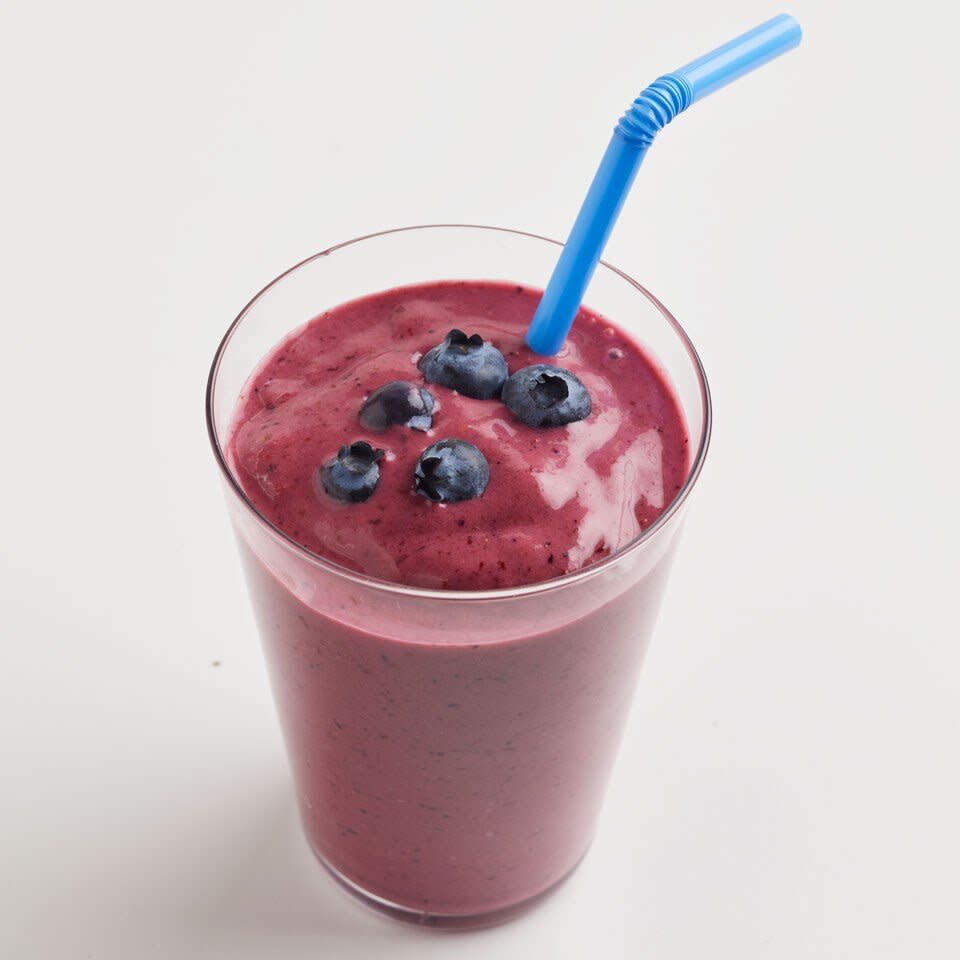3 Surprising Reasons Your Gut Health Matters

Pictured Recipe: Broccoli, Chickpea & Pomegranate Salad
Fun fact: Each of us has a microbiome-some call it our "forgotten organ"-made up of trillions of bacteria living inside our gut. Each busy micro-universe is unique, depending on our own particular mix of bacteria. "It's just like a fingerprint," says Kristi L. King, M.P.H., R.D., clinical instructor at Baylor College of Medicine and a spokesperson for the Academy of Nutrition and Dietetics.
According to a growing stack of studies, our gut bacteria affect much more than digestion. And balancing the beneficial bacteria with the harmful bugs is key to keeping your gut happy and humming along.
Here are some surprising ways a healthier gut can mean a healthier you-plus simple eating tips to help keep your gut bacteria in check.
1. Helps with Weight Loss
Animal studies have shown a link between weight and gut health. When researchers at the University of Iowa gave mice a drug known to cause weight gain as a side effect, they discovered that the rodents' microbe composition shifted, and slowed down their metabolism. An abundance of the wrong bacteria in our gut may even cause unhealthy cravings, according to a study in BioEssays. By controlling our hormones and hijacking the nerve that connects our brain to our gut, bacteria may manipulate us into making poor food choices.
Now, a new Swedish study of more than 600 people adds to the evidence. The researchers identified four types of gut bacteria directly related to a person's BMI. The more of these "bad" bacteria participants had, the larger their waists. The scientists hope to learn how changing the mix of gut bacteria can help lower the risk of obesity.
Related: Can Your Gut Bacteria Help You Lose Weight?
2. Improves Heart Health
It's truer than you might think: the way to your heart is through your stomach. Studies suggest a healthy gut may help raise good (HDL) cholesterol and lower the bad (LDL) kind, preventing heart disease. A 2014 review of several studies also found that eating probiotics-the live, good bacteria found in fermented foods-seemed to slightly lower high blood pressure. And in a 2012 study, researchers in Sweden found that, compared with the microbiomes of healthy people, the gut bacteria in stroke patients produced fewer carotenoids, antioxidants believed to protect against stroke and angina.
Related: Heart-Healthy Recipes
3. Boosts Immunity
Think about it: Someone with the flu touches a doorknob right before you do-and then you gobble down a bag of chips without stopping to wash your hands. You can thank your healthy gut for helping fight those flu bugs. By building up a protective barrier against the bad guys, your gut helps fight infection, keeping you well. "The immune system stems from the gut," King says.
Related: 5 Immunity-Boosting Foods & Nutrients
More Surprising Benefits

Pictured Recipe: Berry-Kefir Smoothie
More research is needed, but early studies look promising for these diseases and conditions:
Cancer: Not surprisingly, a number of animal studies have found links between poor gut health and colon cancer. Other research suggests that the anti-inflammatory properties of good gut bacteria may help slow or stop the growth of some types of cancer, including leukemia and lymphoma.
Mental health problems: Experts talk a lot about the "gut-brain axis," the communication pathway between the GI tract and central nervous system. Emerging research shows those signals may help find new treatments for depression, anxiety, eating disorders and other issues.
Food allergies: Scientists aren't sure exactly how it works, but changing the gut flora seems to help build up a tolerance to certain foods, preventing allergic reactions, King says.
Related: How Good Gut Bacteria Could Transform Your Health
Eating for a Healthy Gut
Just as a thriving garden depends on the right mix of plants, your gut relies on a good balance of bacteria. Nurture your "gut garden" with these tips:
Eat more probiotics. Fermented foods like kimchi, yogurt and fresh sauerkraut provide the gut with beneficial bacteria. Not all bacteria survive the trip through the stomach, but those that do either settle in the gut or provide healthy benefits as they pass through.
Feed good bugs with prebiotics. Jerusalem artichokes, onions, garlic and other prebiotic foods contain fibers our bodies don't digest, leaving leftovers for the good gut bacteria to eat. They also keep things moving-something essential for gut health. Related: Top Fiber-Rich Foods for Good Gut Bacteria
Starve out bad bacteria. Go easy on chips, store-bought sweets and other highly processed foods. They're loaded with added sugars and fat that feed the bad bacteria (the "weeds" in your garden) associated with obesity, allergies and other problems. Related: 3 Foods to Ditch for a Healthy Gut
Hydrate. "Drinking water is so, so important for a healthy gut," King says. Besides pushing nutrients through our system, water also helps us poop. "By being able to have regular bowel movements, you're getting rid of some of that bacteria and allowing other new bacteria to take that space," King says.
Related: 7 Refreshing Foods to Help You Stay Hydrated
The Bottom Line
Scientists are still learning the many ways a healthy gut helps us stay well. But one thing is clear, says King: "Take care of your gut and it wiil take care of you."
Watch: What Does a High-Fiber Day Look Like?
Some original reporting by Lori Kase and Gretel H. Schueller

